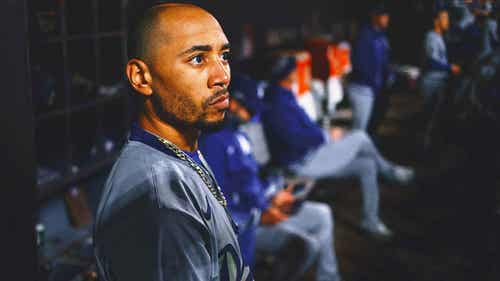Can't? Don't say that to Paralympic archer Shaun Anderson
PARIS (AP) — There's one thing you shouldn't say to South African archer Shaun Anderson, who has competed at three Paralympics after two life-altering incidents.
“I don’t believe in the word ‘Can’t,’ don’t say that word around me," Anderson says. “If you put your mind to it, you can do it."
He lost his left arm in a motorbike crash in 2004 and went to the 2016 Rio de Janeiro Games shooting compound archery standing up. A boating accident in 2017 then left him paralyzed from the waist down, so he learned how to shoot from a wheelchair.
At the Tokyo Games he reached the second round, and in Paris he went one stage further, the quarterfinals, where he lost 136-134 in W1 for athletes with impairments in the top and bottom half of their body.
The 51-year-old Anderson geed himself up by listening to South African rapper Jack Parow, and roused the crowd by vigorously waving his right arm before shooting through a device attached to his mouth.
“I knew if they got behind me, the personality I’ve got would just force me to shoot better,” he says. "We don’t have scopes and peeps (peep sights). We float in the yellow (center circle), out the yellow, and the heart’s pumping at 300 beats per minute and (suddenly the arrow is) going in the blue (ring far from the center),” he adds with a laugh.
Anderson is eyeing a fourth straight Paralympics at Los Angeles in 2028, but his other big plan — one close to his heart — is raising mental health awareness.
“Mental health is a serious thing. You need to talk. Find somebody and speak. It’s one of the biggest problems out there in the world," Anderson says. “I’ve seen top athletes win medals and then the next minute they disappear. You don’t know why and then you find out ..."
Anderson suddenly looked away pensively and didn't finish the sentence. He reflected on his own experience.
“I had to dig very deep because I got PTSD from my accident, I had to fight that," he says. “I’m very outspoken about PTSD.”
Anderson started suffering post-traumatic stress disorder following the boat accident off the coast of Natal in southern South Africa. He helped his wife, their two children and four others get off the boat when it was struck by a huge wave. After they jumped, Anderson slipped into the sea and the boat fell onto him. He was underwater more than four minutes and preparing to die.
“I knew I was drowning," he says. “I had made my peace.”
After leaving hospital, Anderson received another huge shock at home.
“My house burnt down."
His run of bad fortune also saw him hospitalized for three months in 2015 with septicemia after his colon burst.
Just three weeks before the 2021 Tokyo Games, Anderson's father died, sending him into severe depression. After Tokyo he didn't shoot for six months.
He encourages people to speak up if they are suffering.
“I put on a brave face for how long? To get yourself through, you've got to dig hard and you've got to speak to somebody. A lot of us athletes are ashamed to do that and we shouldn't be," he says. "So, for me, a big drive going forward is working on mental health and athletes. (People) look at us all the time and think we're having a great time.”
On arriving in Paris, he suffered a serious anxiety attack during a medical check.
“They put me in the MRI when I got here and that just triggered the PTSD,” Anderson says. “I thought I would just go and put my hand in there (but) they put my whole body in. I freaked out.”
With his competition over, Anderson plans to visit the Eiffel Tower and attend the closing ceremony this Sunday. A new wheelchair from a couple who sponsor him back home is expected to arrive the day before.
When he returns to South Africa, Anderson will start thinking about LA and continue working with Odyssey Archery, an indoor archery range for young people from disadvantaged backgrounds. And telling them there's one word he doesn't believe in.
___
AP Paralympics: https://apnews.com/hub/paralympic-games









